To close the month of April and welcome May, the Atlanta Opera presented one of its most compelling casts and offered a memorable reading of Bizet’s immortal masterpiece, Carmen.
In a bold decision, the company handed the direction of this revival (the production premiered in our city in 2012,) to director Brenna Corner, a member of the Atlanta Opera Studio. Ms. Corner was thus pitted against director Jeffrey Marc Buchman, who’s work at the time of the production’s premiere, we recall, left the door open for corrections. While some details in the direction of the current revival, such as the over-sexualization of the heroine during the first act, as well as introducing a mentally deranged Don Jose in the opera’s final scene can be classified as a misfire, the comparisons to the premiere generally favor Ms. Corner, who focused a great deal of attention to the development of her principals clashing personalities, and thus underlined the dangerous consequences of their pairing. From the pit, Carl & Sally Gable music director Arthur Fagen led the performance at a careful pace, adjusting his tempi to the needs of his singers (specially Ms. Abrahamyan) and making due with some uncharacteristic mishaps from the Atlanta Opera Orchestra (the french horn solo during Micaela’s aria being particularly cringe worthy). We credit him for keeping the totality of the performance intact.
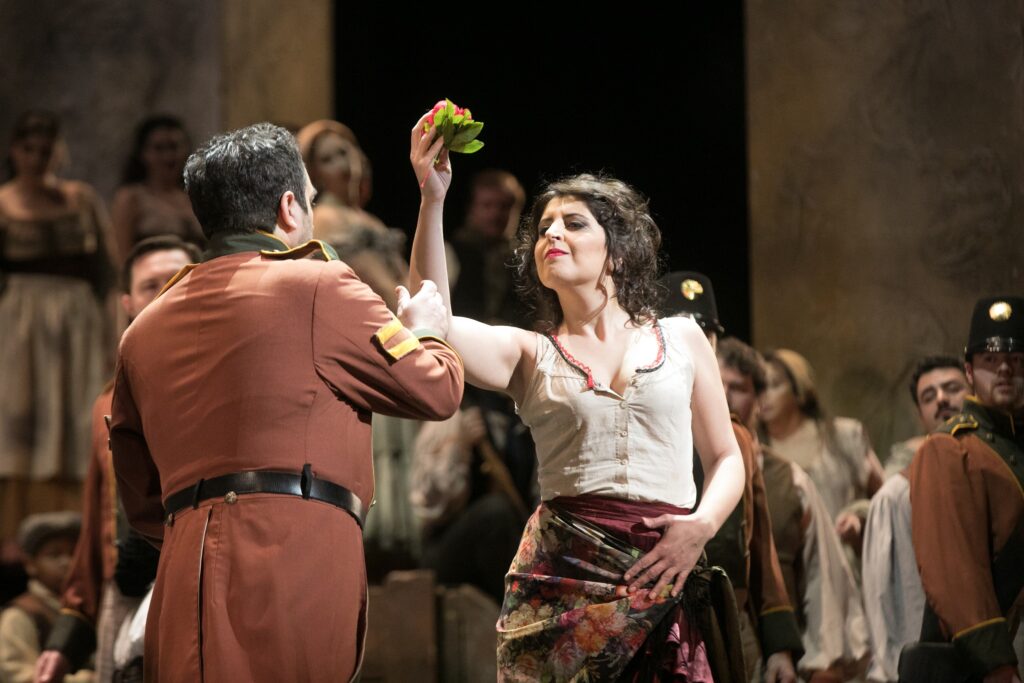
In its 38 year history, the Atlanta Opera has featured four Carmens of very different persuasion, and your friends at newoutpost are among the lucky to have experienced them all in the flesh. Perhaps none has projected the role’s seductive possibilities quite like Dolores Ziegler’s exquisite mezzo soprano back in 1992. In 2004 Emily Golden, though able to fill the intimidating acoustics of the Civic Center, was competent but undistinguished. Mezzo soprano Maria Jose Montiel took on the role when this current production was unveiled on the stage of the Cobb Energy Center in 2012, and despite having all the necessary ingredients to make a memorable impression, was unable to muster the artistic compass to realise her promise. Our current Carmen, Verduhi Abrahamyan, introduces a more complex case. She represents the line of contraltos who once owned the part, and makes a valid argument for their reinstitution. The voice is robust, well placed and slow to unravel. Her production is sturdy, which can default as matronly if she’s not careful. Perhaps aware of this, she managed to knead a sultry element into it through broad and meticulous phrasing, and fulfilled the seductive elements necessary for the first act despite not projecting an obvious sex appeal. Vocally speaking, she is not overly creative in terms of diction, so vital to french music of this kind (to paraphrase Andre Tubeuf: good singing is first of all good speaking,) and if the cantabile in the card scene is indicative, there are many aspects of her scale that still require equalization. Instead, her big, dark hued instrument served a more utilitarian role, and her thoughtful phrasing provided a steady musical basis for her peculiar interpretation.
As seen on the performance of May 4th, Ms. Abrahamyan’s impersonation is made attractive by the volatility of her character rather than by an obvious sexuality. Her Carmen is assertive, ironic, and at times ridiculous. There’s a earnest veracity in how she weighed each situation and arrived at the morally ambiguous option time and time again. Coupled with an unexpected sweet disposition (her Carmen is nurturing and playful with the town’s children, and is even tender to Don Jose in her rebuffs during the final scene) Ms. Abrahamyan presents a gypsy with a curiously endearing personality who achieves an odd maturity by the opera’s curtain. Juxtaposed against the bravado and intensity of her Don Jose, the warning signs that this pairing may lead to a disastrous conclusion resound alarmingly by the latter half of the opera’s second act.
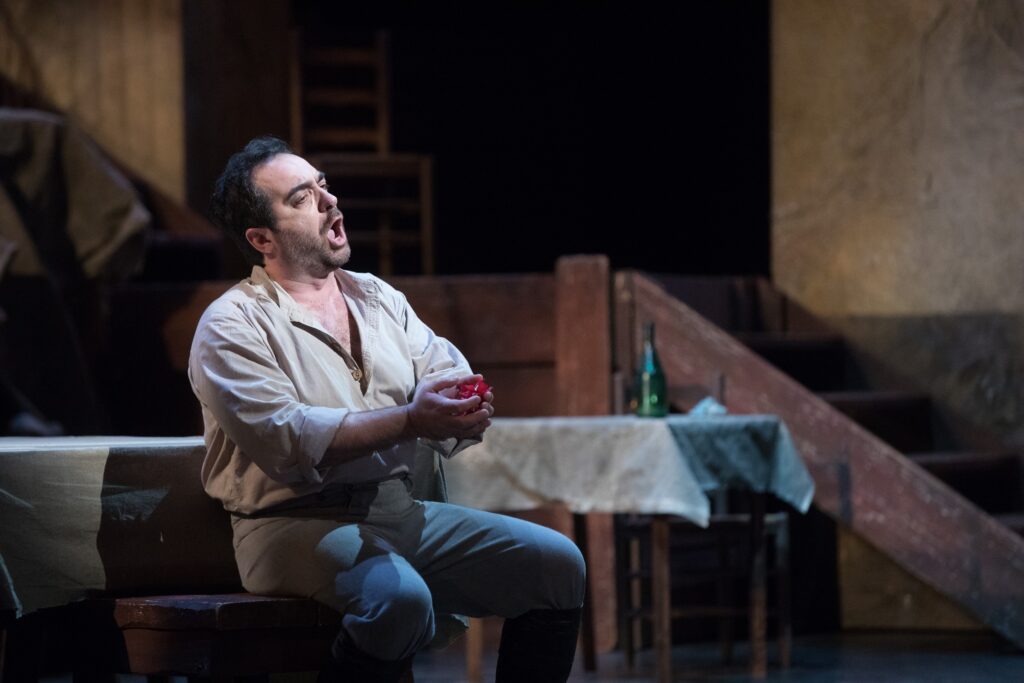
For his part, tenor Gianluca Terranova gave us the brazen Don Jose we had come to expect considering his pedigree. While he does not fully recall greats like Mario del Monaco, Franco Corelli or Giuseppe di Stefano, he is surely not a too distant cousin, and in both outpouring and mannerism he most certainly shares their lineage. This is Mr. Terranova’s third presentation before the Atlanta audience, and the assignments continue to exploit the heroic side of his instrument. While Mr. Terranova seems to delight in the opportunity, with this should come a gentle warning, for the rubber band can only be stretched too much in either direction, and already a loss of freshness in the tenor’s tone can be detected since his debut three years ago. That observation aside, Mr. Terranova still has plenty of voice to burn, and it sure is fun to hear him flinging out his open throated, italianate phrases out into the auditorium with such exuberant abandon.
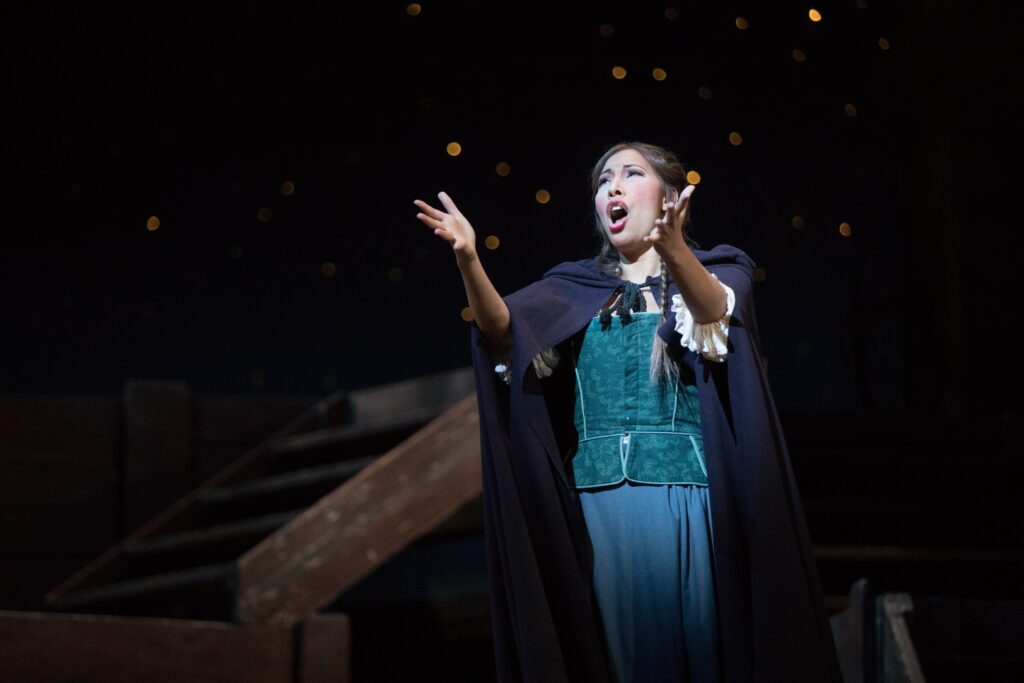
Also representing the Italian school was the Micaela of Nicole Cabell, who has delighted the Atlanta Opera audience with her luxurious lyric soprano since her 2010 debut as Pamina in Mozart’s Die Zauberflote. That debut, as well as her subsequent performances as Gounod’s Juliette, presented a singer who’s vocal destiny pointed beyond its current repertoire. Her soprano has a gleaming, lush quality, and is best heard when floated in long lines that allow the ear to luxuriate in its attractive dark hue. That her voice seems to be in a constant state of transition which will ultimately force her to abandon its lyric designation for that of spinto remains a topic of discussion, for even at the time of her debut we sensed that she was essentially miscast. As in the case with Ms. Netrebko, who made her relationship with the Metropolitan Opera in the 2000s one decade long audition for the right role to fit her talents, Ms. Cabell continues to adjust her instrument to roles which do not completely take advantage of her possibilities. She is of course a much better singer than her Russian colleague, but we digress. Now, we’re aware that Ms. Cabell is a California native, but the traditions she hails in her singing is positively Italian. The way she approached her famous aria, “Je dit que ne rien m’epouvant”, building a broad line and carefully sustaining its density over the orchestra, recalled the work of some fine Italian Micaelas of the past. That she could not successfully maintain this manner of production implies that she must soon consider revamping her technical methods in order to acclimate herself into the lyrico spinto repertoire that we’re sure is her destiny. Until that day comes, we applaud Ms. Cabell for providing the glamourous instrument the part of Micaela has been missing all of these years.
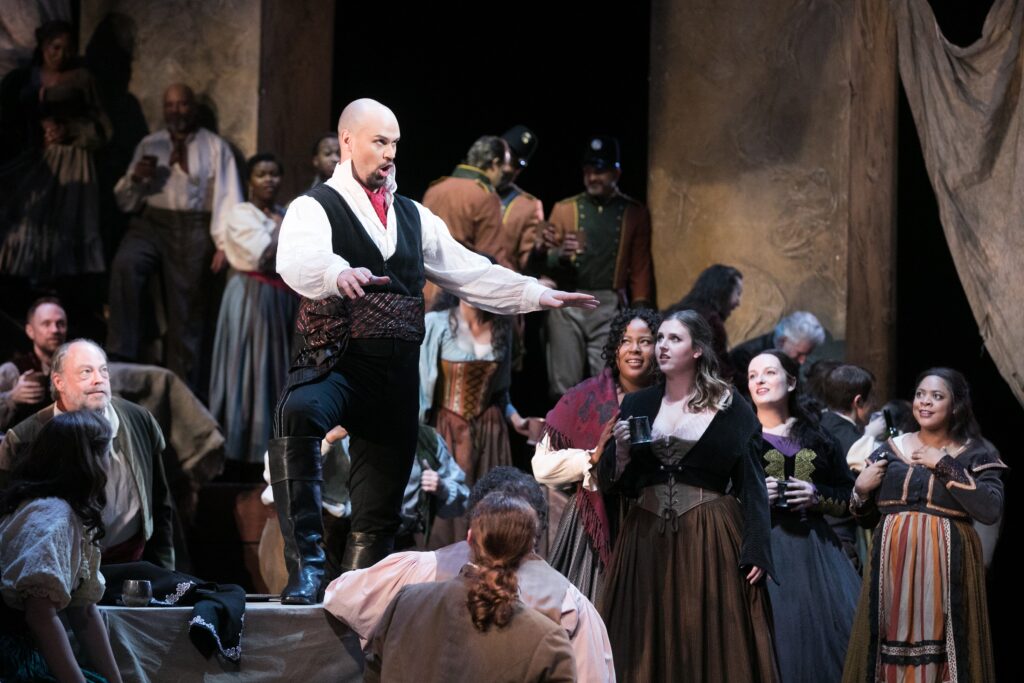
Recalling the impact of his fine debut as Valentine in Gounod’s Faust in 2014, baritone Edward Parks’ Escamillo was a bit of a let down. His transparent baritone is clear and expressive,, and it is ironic that his voice would be most suited to this type of music in a French venue. When applied to the dimensions of the Cobb Energy Center, the value of his instrument (in particular the lower tones of his scale) dissipates. This robbed his famous entrance solo and the knife duel of their alpha male swagger, and was best heard during the short duet with Carmen in the final act.
Bizet relies heavily on the chorus to set the local color and musical tinta of Carmen. Returning to Atlanta after her success in last season’s Turandot, chorus master Lisa Hasson polished the Atlanta Opera Chorus into bright and expressive unison. Her work was complemented by children’s chorus master Rolando Salazar. The supporting cast was nearly spotless, headed by the world class Zuniga of bass baritone David Crawford. Bass Calvin Griffin’s Morales seemed unphased by the responsibility of tackling the opera’s complicated opening number, and set a high standard for all to follow. For the pair of bandits, the Atlanta Opera summoned the stylish voice of baritone Joseph Lattanzi as Le Dancaire, while tenor Justin Stolz made for luxury casting as Le Remendado. Carmen’s girlfriends share many of her celebrated numbers, and they were well served by the Mercedes of mezzo soprano Sofia Selowsky and the Frasquita of soprano Kailtyn Johnson (in that order).
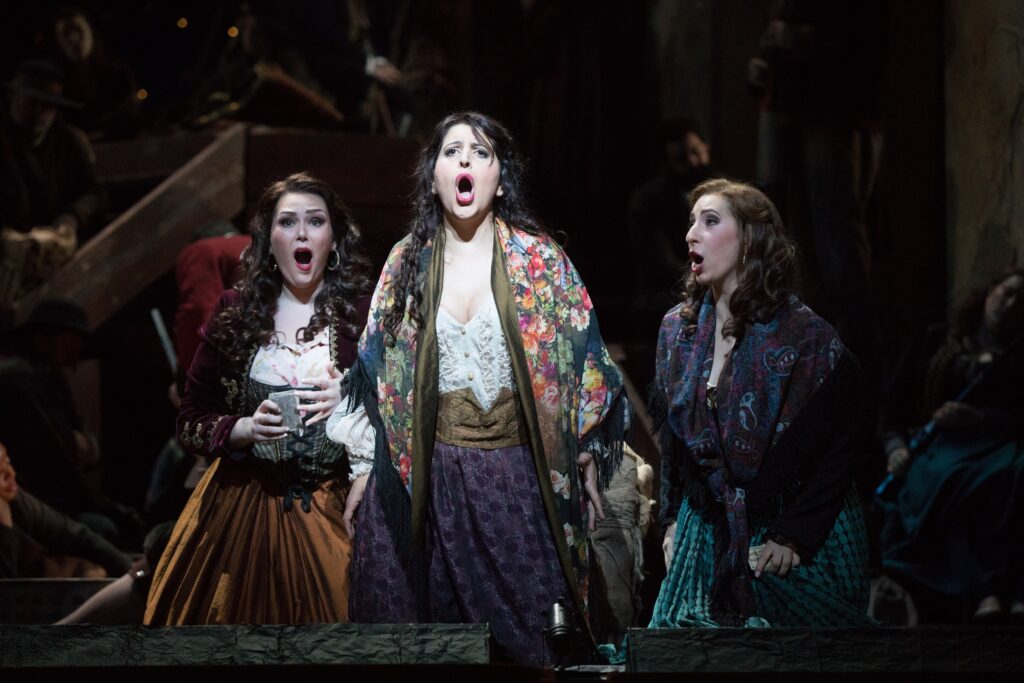
The Atlanta Opera closes its season of mainstage productions in June with Sondheim’s Sweeney Todd. For details, please visit the company’s website at www.atlantaopera.org
-Daniel Vasquez